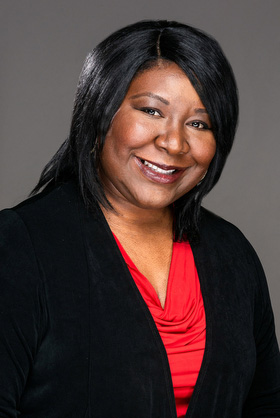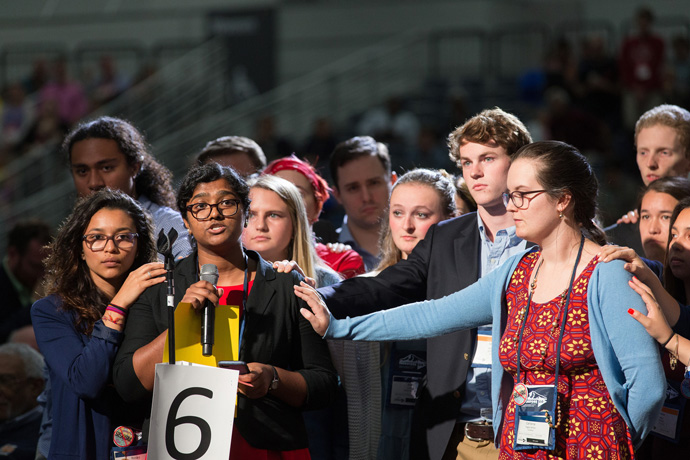In one hour, four young United Methodist leaders addressed why now is the time for the church to engage in dismantling racism and how each local church can — and must — make a change in the communities where it is serving.
Calling out the names of Black lives lost, the Rev. Theon Johnson III said inaction goes against the commandment to “love God, love neighbor and love oneself.”

Photo by Martin Kim.
The Aug. 26 broadcast on The United Methodist Church’s website and Facebook page was part of a series of denominational town hall meetings held to discuss eradicating racism. Also taking part were Ann Jacob, Andres De Arco and Katelin Hansen. Erin Hawkins, top executive of the United Methodist Commission on Religion and Race, was moderator.
Johnson is pastor of Downs Memorial United Methodist Church in Oakland, California. Calling his community the “hub” for innovation, Johnson said repentance is an act of innovation.
“We have a responsibility to pick up the pieces to who we once were — we ought to get into some good trouble. Ruffle a few feathers. Make our mark in the world for the sake of God through Jesus.”
De Arco, who is national assistant director to the United Methodist Hispanic Youth Leadership Academy, said this time in history is not that different, noting that “this country … was founded on racist ideas.”
“Now we have George Floyd … now we have no choice but to confront racism,” he said. Floyd, an African American, died May 25 at the hands of Minneapolis police officers after being pinned to the ground and unable to breathe.

Hansen, a United Methodist deaconess, said “this is an interesting moment, but we need to give credit to young people who have done the work for years.” She said before Floyd there was Michael Brown and Freddie Gray, and people took to the streets when they were killed also.
“We have created a moment now where we are not afraid to say Black Lives Matter. But I remember when I wondered if it was OK if I wore a Black Lives Matter t-shirt to annual conference,” she said. Hansen serves at Community Development for All People and the United Methodist Church for All People in Columbus, Ohio.
Find resources
Additional Town Halls will take place through the end of the year, and the topics will include:
- The theological roots of racism and colonialism
- Voter suppression
- Intersectionality in Anti-Racism Work
- Colonialism and the Doctrine of Discovery
- Systemic Racism in the UMC
Ann Jacob, who serves at Edmonds United Methodist Church in Washington, a predominantly white congregation, said, “It is heavy work if you are the only person of color actively doing antiracism work.”
It is a long journey, she added, and anyone who doesn’t believe that will be disappointed.
“You have to build relationships, bridge differences, teach, teach, teach. Learn, unlearn, build relationships and find accomplices.”
The young leaders said the denomination needs to make deep, structural changes that invite new leadership at every level.
“In my experience of working in the church, lots of times the push for new leadership only goes as far as the current leadership feels comfortable,” said De Arco.
“It takes trust to say, ‘If I let go, God will continue,’” Johnson said. “How can we expect stagnant structures to create dynamic people? It like saying, here go draw a square circle.”
Hansen pointed out that “heart is the domain of the church.”
“We have the language, we understand generational sin, corporate sin, that justice goes alongside reconciliation,” she said.
“Being stuck in guilt separates us from God and others,” Hansen said. “We are a mainline denomination, we have the doctors, the lawyers, the politicians in our pews. How are we using our context to move the needle?”
Gilbert is a UM News reporter in Nashville, Tennessee. Contact her at 615-742-5470 or newsdesk@umcom.org. To read more United Methodist news, subscribe to the free Daily or Weekly Digests.
Like what you're reading? Support the ministry of UM News! Your support ensures the latest denominational news, dynamic stories and informative articles will continue to connect our global community. Make a tax-deductible donation at ResourceUMC.org/GiveUMCom.




